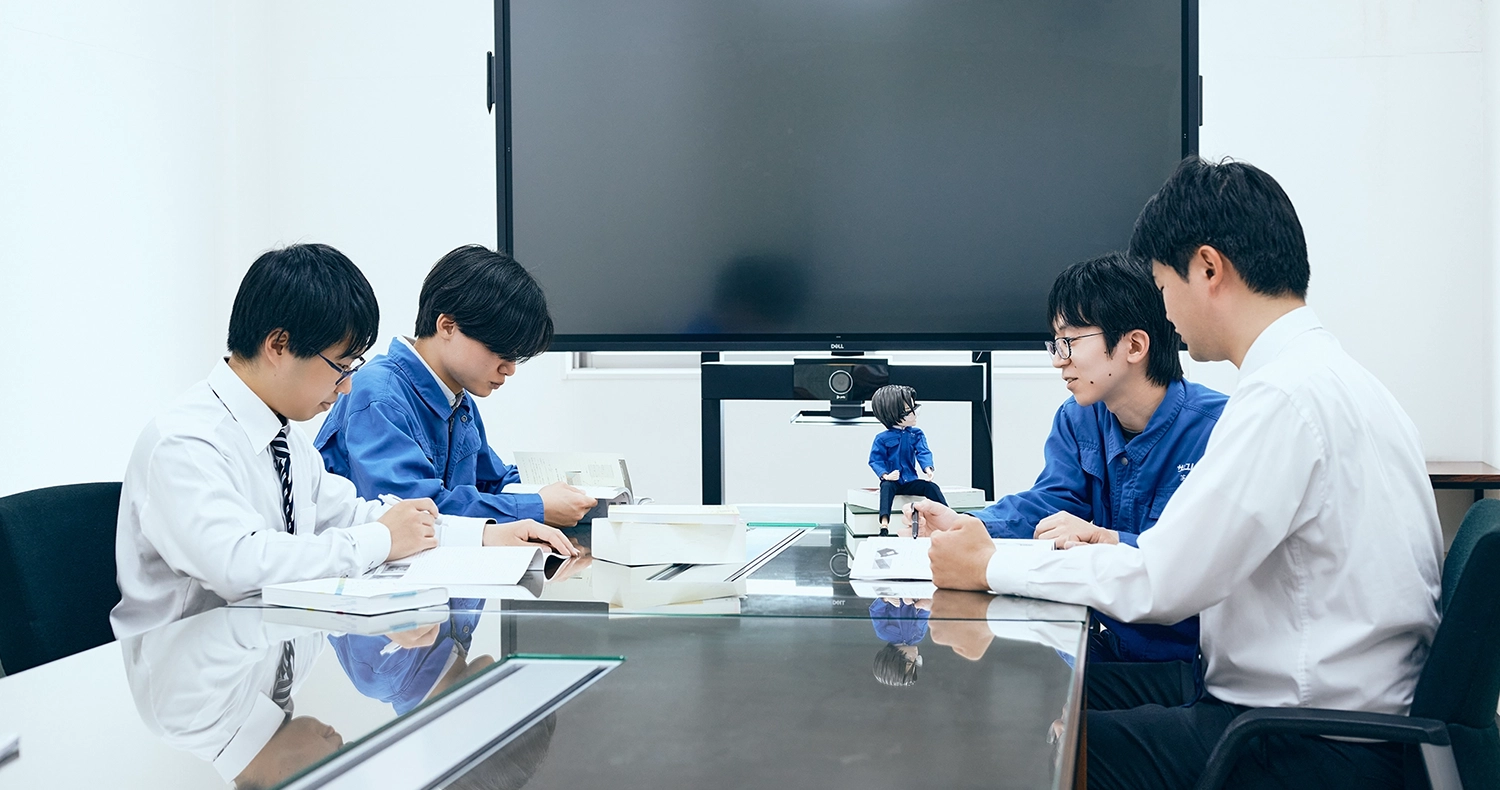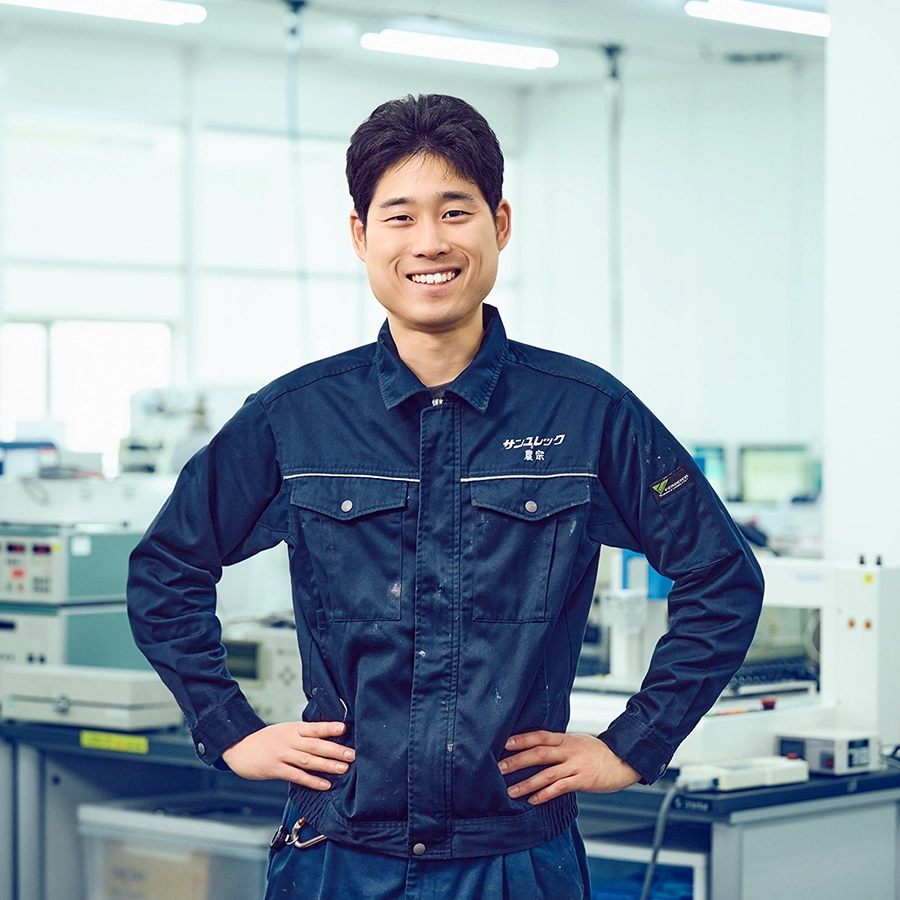Promise for
empowerment
Investing in People

Interview
Support for Earning Doctorate Degrees for Working Adults
I was able to develop the ability to identify and implement themes that contribute to society.

Development Department, Material Development Group
Tatsuki Nousou
Degree Earned: Doctor of Engineering
Q: Nousou-san, you are the first in the company to obtain a doctorate using SANYU REC's "domestic study program." Congratulations! Was it difficult to balance work and study?
Yes, I enrolled in the doctoral program at the School of Engineering at Kinki University, which is located in Hiroshima. Although the actual time spent traveling to the campus was short, commuting was quite challenging. Additionally, as my children were only two and three years old, I was juggling parenting support along with my studies and work.
Q: Why did you decide to pursue a doctoral program?
I wanted to complete the research theme I started during my master's program. Under Professor Kohei Shiraishi, who had guided me through my bachelor's and master's degrees, I conducted research on biomaterials that could promote regenerative medicine in the Laboratory of Biomaterial Chemistry.
Q: Is the content of your research applicable to your work at SANYU REC?
No, it's fundamentally unlikely to be applied directly. It's fair to say the company acknowledged my personal interest to a certain extent.
Q: What did SUNYU REC expect you to learn in the doctoral program?
Currently, I am responsible for creating new research and development systems using AI and digital transformation (DX). While enrolled at Kinki University, I could attend lectures at Hiroshima University, which focuses on AI, digital manufacturing, and innovation. I was encouraged to study intensively while there, alongside my research on biomaterials.
At Hiroshima University's Digital Manufacturing Education and Research Center, they are currently working on creating environmentally friendly material technologies through industry-academia-government collaboration, backcasting from industrial needs to model desired functions. During my studies, I interacted extensively and exchanged information with Professor Joji Oshita, Professor Takayoshi Ishimoto, and Assistant Professor Yusuke Kanematsu.
Q: That seems like extensive support.
SANYU REC is currently filled with a spirit of actively taking on new challenges. I feel they expect this initiative to further energize that atmosphere.
Q: What results have you achieved through your doctoral studies?
I believe I've honed my ability to identify my own research themes and the drive to implement them. Rather than centering around my interests, I learned the importance of focusing on how my work can contribute to society. In writing my thesis, I also learned to consider whether it could inspire ideas in others, from various perspectives.
Q: It seems you've developed a universal capability that can be applied to all aspects of your work. However, studying biomaterials research and AI & DX seems quite different. Did you find it confusing to progress them simultaneously?
Looking back, I've always been the type to pop into various labs and learn other people's research from my student days (laughs). I guess I'm naturally good at learning multiple fields simultaneously. Even now, I'm exploring what can be done jointly across different departments, with AI & DX as the hub.
Q: That's impressive. Breaking down silos with cross-disciplinary actions is essential for driving new transformations.
On the other hand, I think it's also important to delve deeply into one's specialty. It's not about whether being "broad and shallow" or "narrow and deep" is right, but about determining which type you are. Both types have the potential to spark innovation. Regardless, it's crucial to act with a perspective on how your efforts can contribute to society, feeling that your actions are making a difference. I believe that enhancing such support systems within the company is necessary going forward.
Q: To catch society's needs, do you have any particular approach?
I try not to think too broadly and instead listen carefully to the issues of people close to me. If one person is facing a problem, it's likely that others are too.
Q: What kind of support would be helpful for others who use the "domestic study program" following you?
In my case, I was able to complete my research in the shortest period of three years because I continued the theme from my bachelor's and master's courses. However, starting from scratch could pose a significant challenge in balancing work and study. Business practice demands very short development times, which is a major gap compared to academic research. To overcome such challenges, we need to strengthen industry-academia collaboration and create an environment where everyone can find long-term research themes. I want to contribute as someone who has also received support.
Q: As part of the Material Development Group, what do you plan to focus on moving forward?
To accelerate development speed, I will continue to work on building systems using AI while also venturing into new technologies and original raw materials that differ from the Technical Department.